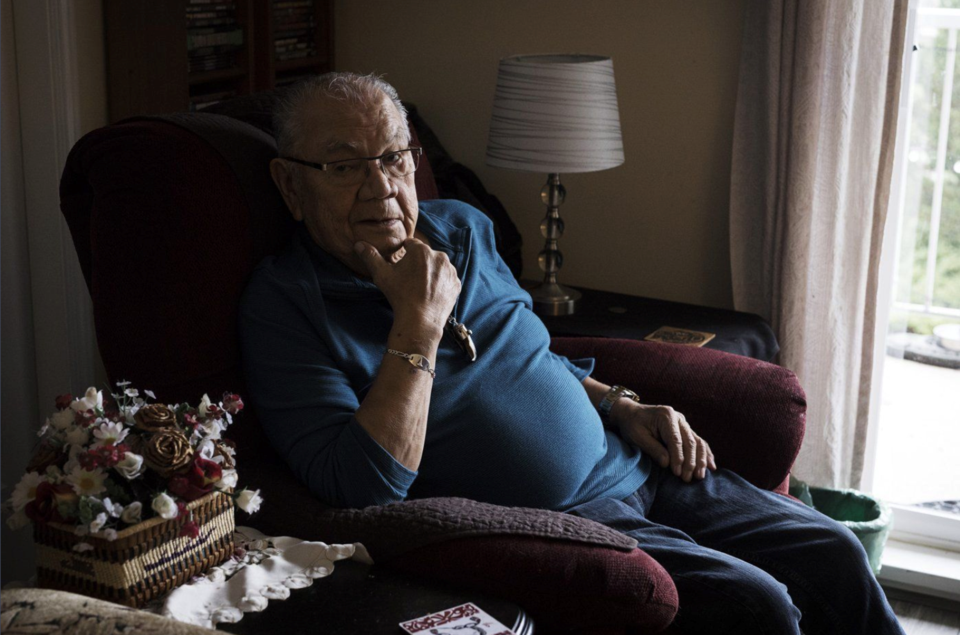Barney Williams is the recipient of the 2022 Courage To Come Back Awards’ addictions category.
Over the past 24 years, the awards have recognized 139 individuals and raised over $20 million for Coast Mental Health to support those living with mental illness.
“It’s awesome,” Williams said enthusiastically. “It really speaks to the work that I’ve done in sobriety.”
As a six-year-old boy, Williams was forced from his home in Opitsaht, on Meares Island, and sent to Christie Residential School.
He spent 12 years at the school, where he was physically and sexually abused by priests, nuns and older students.
It took the now 82-year-old over six decades before he shared his story. But in 2005, he faced a room full of strangers and gave his testimony during a hearing for the Truth and Reconciliation Commission.
Those early life experiences drove him to alcohol, which he used to numb the pain.
There were periods he would drink for 90 days straight, waking up in a hospital bed or jail cell, unable to remember how he got there.
Eventually, he had had enough and committed to sobriety when he was 26 years old.
Williams was still living in Opitsaht at the time.
“There was lots of drinking going on,” he said. “It was really challenging because I was living right in it.”
Some people around him continued to try and persuade him to have “one” more drink, he said.
But with his grandmother’s encouragement, he resisted the urge.
“The culture and traditional teachings that she was giving me at the time helped me have strength,” he said. “Strength not to [give in].”
Williams said his grandmother was by his side from “day one,” right up until her death in 1974.
After receiving the award, Williams said he was filled with memories of her.
“She was so patient and she had this aura of peace about her,” he said. “I was able to really relish in that over the years.”
The Tla-o-qui-aht elder also recalls friends who were struggling with their own addictions, but left their beers outside on the front porch to share tea with Williams instead.
“I [haven’t] forgotten those people,” he said. “Some of them didn’t make it because the additions got to them.”
At 31 years old, Williams went on to study social work at the Malaspina College, now known as Â鶹´«Ã½Ó³»Island University.
His studies landed him a job with Indigenous and Northern Affairs Canada in Nanaimo, where he worked for 17 years.
Williams later challenged a four-year undergraduate program and received his certificate as a registered clinical therapist in just 10 months.
He was further recognized for his work by being awarded an Honorary Doctor of Laws from the University of Victoria in 2017.
After dedicating the majority of his life to mental health support and addiction recovery, he feels “a bit of excitement” knowing these issues are becoming more widely discussed.
“We never acknowledged that people needed to be supported,” he said. “Whether it's addictions or disabilities – [it’s important] to be there for people who need a good listening ear, or somebody that believes in them.”
While Williams said it’s an honour to be this year’s recipient, he is equally moved by all those who came before him.
“We don't recognize the struggles that one goes through to … sober up, and then to stay sober,” he said. “It’s challenging and it’s nice that the [courage awards recognize] that.”
Naomi Perks, Coast Mental Health marketing and communications manager, said that by recognizing those who have overcome mental health challenges, the awards aim to bring hope to anyone struggling on their own journey.
“The struggle isn’t hopeless,” she said. “Recovery can happen.”
From September to January, hundreds of nominations were accepted from across the province for the awards’ five categories: mental health, addiction, youth, medical and physical rehabilitation.
Recipients were selected by a panel group for each category that’s made up of stakeholders, health professionals and peers, said Perks.
On May 14 at 4:30 p.m., Global News BC and Vancouver.Citynews.ca broadcasted a one-hour television show to celebrate the recipients.
“Never have these stories of resilience and strength been more relevant than now,” said Lorne Segal, Courage to Come Back Awards chair. “I am proud to know these stories of human triumph over adversity will reach so many at a time when hope is so important.”
When Williams looks back on his life’s challenges, he said he “can’t help but be happy that I’m still here.”
“Today,” he said. “I continue to provide help to those who are less fortunate than me by using the challenges that impacted my life to help others in their journey.”



